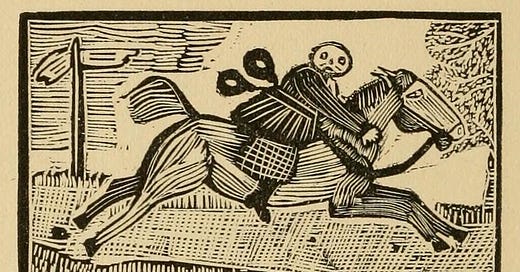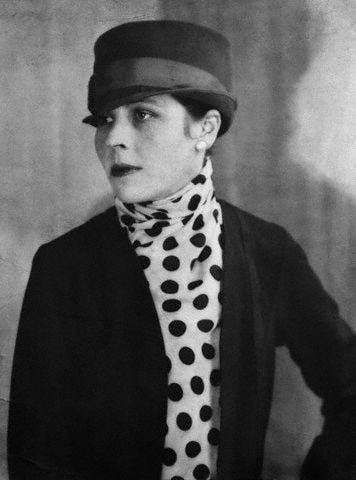A Mysterious Figure Appears at Dusk...
We continue our celebrations of LGBT History Month (UK) with the beginning of an early short story by the iconoclastic Djuna Barnes
‘A Night Among the Horses’ (1919)
Toward dusk, in the Summer of the year, a man dressed in a frock coat and top hat, and carrying a cane, crept through the underbrush bordering the corral of the Buckler farm.
As he moved, small twigs snapped, fell and were silent. His knees were green from wounded shrubbery and grass, and his outspread hands tore unheeded plants. His wrists hurt him and he rested from time to time, always caring for his hat and knotted yellow cane, blowing through his moustache.
Dew had been falling, covering the twilight leaves like myriad faces damp with the perspiration of the struggle for existence, and half a mile away, standing out against the darkness of the night, a grove of white birches shimmered like teeth in a skull.
He heard the creaking of a gate, and the splashing of late rain into the depths of a dark cistern. His heart ached with the nearness of the earth, the faint murmur of it moving upon itself, like a sleeper who turns to throw an arm about a beloved.
A frog began moaning among the skunk cabbages, and John thrust his hand deep into his bosom.
Something somnolent seemed to be here, and he wondered. It was like a deep, heavy, yet soft prison where, without sin, one may suffer intolerable punishment.
Presently he went on, feeling his way. He reached a high plank fence and sensing it with his fingers, he lay down, resting his head against the ground.
He was tired, he wanted to sleep, but he searched for his hat and cane and straightened out his coat beneath him before he turned his eyes to the stars.
And now he could not sleep, and wondered why he had thought of it; something quick was moving the earth, it seemed to live, to shake with sudden immensity.
He heard a dog barking, and the dim light from a farm window kept winking as the trees swung against its square of light. The odor of daisies came to him, and the assuring, powerful smell of the stables; he opened his mouth and drew in his moustache.
A faint tumult had begun. A tremor ran under the length of his body and trembled off into the earth like a shudder of joy—died down and repeated itself. And presently he began to tremble, answering, throwing out his hands, curling them up weakly, as if the earth were withholding something precious, necessary.
His hat fell off, striking a log with a dull hollow sound, and he pressed his red moustache against the grass, weeping.
Again he heard it, felt it; a hundred hoofs beat upon the earth and he knew the horses had gone wild in the corral on the other side of the fence, for animals greet the Summer, striking the earth, as friends strike the back of friends. He knew, he understood; a hail to Summer, to life, to death.
He drew himself against the bars, pressing his eyes under them, peering, waiting.
He heard them coming up across the heavy turf, rounding the curve in the Willow Road. He opened his eyes and closed them again. The soft menacing sound deepened, as heat deepens, strikes through the skin into the very flesh. Head on, with long legs rising, falling, rising again, striking the ground insanely, like needles taking terrible, impossible and purposeless stitches.
He saw their bellies, fawn-coloured, pitching from side to side, flashing by, straining the fence, and he rose up on his feet and silently, swiftly, fled on beside them.
Something delirious, hysterical, came over him and he fell. Blood trickled into his eyes down from his forehead. It had a fine feeling for a moment, like a mane, like that roan mare’s mane that had passed him—red and long and splendid.
Illustration from The Diverting History of John Gilpin: Shewing how he went Further than he Intended, and came Safe Home Again, by William Cowper; 1906, featured by The Public Domain Review.
What we love about this passage…
We are immediately thrown into a narrative with minimal details: a man at sunset creeps around a farm. Beginning in the middle of things is a common technique of authors to grab a reader’s attention, but Barnes uses it here to catch us off guard. This raises the tension of the scene, and the more we read, the more questions we might have. Why is he so fixated on the horses?
A grove of white birches shimmered like teeth in a skull.
Yet, Barnes gives very little away, directly. It is in the details of the scene, such as the description of the trees, that we are able to get a sense of the forbidding tone and the menace which seems to lurk all around. As the perverse description of his wound as ‘red and long and splendid’ suggests, it is perhaps this feeling of danger that has attracted him in the first place.
About the Author
Djuna Barnes (1892-1982) lived a long and eccentric life. Born in New York state, she moved to New York City in early adulthood where she threw herself into its various subcultures, as well as journalism, illustration, and literature. In the 1920s, she became a member of the Provincetown Players, a theatrical company that helped to make the careers of figures such as Susan Glaspell and Eugene O’Neill. While living in Europe, she published her avant-garde novel Nightwood (1936) which won her respect from TS Eliot and cemented her reputation as a Modernist writer.
(Photograph of Djuna Barnes from 1921, courtesy of Wikimedia Commons)
Suggest a LitHit!
Tell us your own favourites from literature you've read, and we can feature you as a Guest Curator. Just email us with the following information:
Your full name
The title of the book you're suggesting
The location of the excerpt within the book (e.g., "in the middle of chapter 5"), or the excerpt itself copied into the email or attached to it (in Word)
Why you love it, in just a few sentences
About LitHits
LitHits helps you make time for reading by bringing you unabridged excerpts from brilliant literature that you can read on the go, anytime or any place. Our curators carefully select and frame each excerpt so that you can dive right in. We are more than a book recommendation site: we connect you with a powerful, enduring piece of literature, served directly to your mobile phone, tablet or computer.
Today's guest curator...
Dr Daniel Abdalla, core member of LitHits and an expert in nineteenth and twentieth-century literature, particularly its relationship to science.
You might also enjoy...
Feedback
We'd love to hear your thoughts on our newsletter:
kirsten@lit-hits.co.uk
Graphic design by Sara Azmy
All curation content © 2023 LitHits. All rights reserved.





